Betty Roche – “Trouble Trouble”
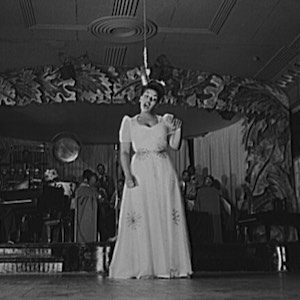
The great Betty Roche lays down a classic be-bop jazz blues vocal. She joined Ellington’s band in 1943. Trouble means the same after 60-plus years.

The great Betty Roche lays down a classic be-bop jazz blues vocal. She joined Ellington’s band in 1943. Trouble means the same after 60-plus years.
 I acquired my love of music for free!! I listened to the AM then FM radio all free, gr8 music filtered regionally, and I overheard most of the jukebox music I loved on someone else’s dime!
I acquired my love of music for free!! I listened to the AM then FM radio all free, gr8 music filtered regionally, and I overheard most of the jukebox music I loved on someone else’s dime!
This site is the 2019 version of my jukebox.
With the aid of copyright law, the recorded music business has all but eliminated any free/legal opportunity to hear quality music these days. I’ve participated in the music biz since 1970, and I’ve watched a lot of horrors, BUT this latest format change could be music’s downfall. I hate doom and gloom talk, but I’m concerned.
The music industry’s largest players created competition to free music-sharing sites. They licensed their vast music catalogues with “take all or nothing” music license to the “deep pockets big guys” and businesses they owned.
They granted an ownership-type deal/license to a site located in Sweden, Spotify (former country of the largest pirate site ”Pirate Bay.”) SO the earnings from these bulk licenses deals have become primary earnings for the multinational businesses and the entire music community. These large music business made profits along with corporate underwriters thru stock sales.
Who is left holding the bag? MUSIC and Musicians who need the free music concept for exposure. I took it on myself to correct this situation. I’m offering a sherpa service thru music that has stood “the test of time” for free. This music is free-for-all in the public domain. I have also designed another site as a playlist to highlight music that I like that has limited value to the current music business structure, but I HOPE IT’S MY CONTRIBUTION TO MUSIC. I want to prevent these neglected works of art from being overlooked and lost. I can’t let that happen!! People who create music are under-rewarded, pawns of the crazy costs it takes just to be heard. They should be rewarded! I hope the free music list helps do this. With so little income for songwriters, we’re losing bright young minds to other industries, and I hope sites like these become important enough to be a new way to help music.
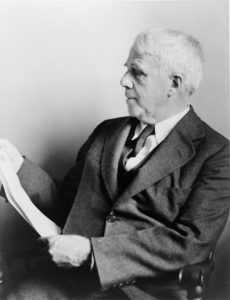
These treasured works by the honored poet Robert Frost become ours on January 1st, 2019. Long overdue, extensions of the copyright law will expire on this new year’s day. Many educators consider this very important to our culture. “The public domain has been frozen in time for 20 years, and we’re reaching the 20-year thaw,” says Jennifer Jenkins, director of Duke Law School’s Center for the Study of the Public Domain. “We have shortchanged a generation,” said Brewster Kahle, founder of the Internet Archive. “The 20th century is largely missing from the internet.” Seems the Disney Company is blamed, for its lobbying for the passage of copyright protection laws for Mickey Mouse, as the reason for this cultural bankruptcy. Whoever is responsible, it’s finally going to change.
Fortunately, these poems and many more works become part of the public domain, available to all, by the correct application of copyright law (copyright expiration). So if you want to read these works of art and make a video of yourself, you can post it anywhere with no one to legally stop you. These beautiful poems were published in 1923 or before, making them 95 years old and available for public ownership.
“THE ROAD NOT TAKEN”
Two roads diverged in a yellow wood,
And sorry I could not travel both
And be one traveler, long I stood
And looked down one as far as I could
To where it bent in the undergrowth;
Then took the other, as just as fair,
And having perhaps the better claim,
Because it was grassy and wanted wear;
Though as for that the passing there
Had worn them really about the same,
And both that morning equally lay
In leaves no step had trodden black.
Oh, I kept the first for another day!
Yet knowing how way leads on to way,
I doubted if I should ever come back.
I shall be telling this with a sigh
Somewhere ages and ages hence:
Two roads diverged in a wood, and I—
I took the one less traveled by,
And that has made all the difference.
“STOPPING BY THE WOODS ON A SNOWY EVENING”
Whose woods these are I think I know.
His house is in the village, though;
He will not see me stopping here
To watch his woods fill up with snow.
My little horse must think it queer
To stop without a farmhouse near
Between the woods and frozen lake
The darkest evening of the year.
He gives his harness bells a shake
To ask if there is some mistake.
The only other sounds the sweep
Of easy wind and downy flake.
The woods are lovely, dark, and deep,
But I have promises to keep,
And miles to go before I sleep,
And miles to go before I sleep.
“FIRE AND ICE”
Some say the world will end in fire,
Some say in ice.
From what I’ve tasted of desire
I hold with those who favor fire.
But if it had to perish twice,
I think I know enough of hate
To say that for destruction ice
Is also great
And would suffice.
“EVENING IN SUGAR ORCHARD”
From where I lingered in a lull in March
outside the sugar-house one night for choice,
I called the fireman with a careful voice
And bade him leave the pan and stoke the arch:
‘O fireman, give the fire another stoke,
And send more sparks up chimney with the smoke.’
I thought a few might tangle, as they did,
Among bare maple boughs, and in the rare
Hill atmosphere not cease to glow,
And so be added to the moon up there.
The moon, though slight, was moon enough to show
On every tree a bucket with a lid,
And on black ground a bear-skin rug of snow.
The sparks made no attempt to be the moon.
They were content to figure in the trees
As Leo, Orion, and the Pleiades.
And that was what the boughs were full of soon.
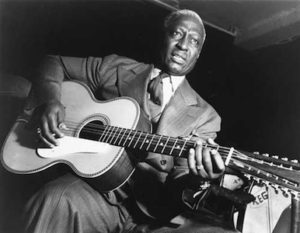
The great Leadbelly, with one of his classic sides that helped define American music in the 20th century and beyond. Over his own distinctive, relaxed guitar accompaniment, Leadbelly’s vocal on this recording is simply magnificent. Widely revered by music fans and covered by blues scholars, “Where Did You Sleep Last Night?” was also sung by Kurt Cobain on Nirvana’s Unplugged album.
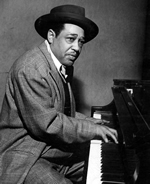 Here’s a magnificent recording of Duke Ellington’s orchestra performing “Louisiana.” Back then there was no such thing as an overdub, much less any auto-tune or fancy editing software. Heck, you even had to mix the record while you were playing it into one mic! These cats could play for real. What a joy to hear such craft and art, delivered with humor and heart.
Here’s a magnificent recording of Duke Ellington’s orchestra performing “Louisiana.” Back then there was no such thing as an overdub, much less any auto-tune or fancy editing software. Heck, you even had to mix the record while you were playing it into one mic! These cats could play for real. What a joy to hear such craft and art, delivered with humor and heart.

First let’s make sure we understand the concept of the public domain
It consists of all the creative works to which no exclusive intellectual property rights apply. Those rights may have expired, been forfeited, expressly waived, or may be inapplicable. Wikipedia
This means the public owns these works, not an individual author or artist as copyright law dictates. With correct research, anyone can use a public domain work without obtaining permission, but no one can ever own it.
Here are some invaluable tools to understanding and finding Entertainment in the Public Domain:
Summed up the research required: There are four common ways that works arrive in the public domain:
Did some research for us for this January 2019. According to them, on what They call “Public Domain Day.” No one owns the rights to these entertainment gems and more:
Safety Last!, directed by Fred C. Newmeyer and Sam Taylor, featuring Harold Lloyd
The Ten Commandments, directed by Cecil B. DeMille
The Pilgrim, directed by Charlie Chaplin
Our Hospitality, directed by Buster Keaton and John G. Blystone
The Covered Wagon, directed by James Cruze
Scaramouche, directed by Rex Ingram
Edgar Rice Burroughs, Tarzan and the Golden Lion
Agatha Christie, The Murder on the Links
Winston S. Churchill, The World Crisis
e.e. cummings, Tulips and Chimneys
Robert Frost, New Hampshire
Kahlil Gibran, The Prophet
Aldous Huxley, Antic Hay
D.H. Lawrence, Kangaroo
Elmer Rice, The Adding Machine
Bertrand and Dora Russell, The Prospects of Industrial Civilization
Carl Sandberg, Rootabaga Pigeons
Edith Wharton, A Son at the Front
P.G. Wodehouse, works including The Inimitable Jeeves and Leave it to Psmith
These timeless works of art contribute to mankind, and can be republished or used for free by any member of the public.
The story of multiple free uses of the film Frank Capra’s masterpiece “It’s A Wonderful Life is a lesson to us all. ”The copyright was not renewed (because of entertainment business reasoning), it became public domain in 1974, and television stations used the free programming whenever they wanted to save money during the Christmas season. Since then, the film soared in popularity to being considered #1 on the Best of the Christmas movies list.
If you’re a creator or a consumer, you’re still a member of the public, and these works are yours to enjoy because we all own them.
Please don’t confuse the “Fair Use” doctrine with “Public Domain.”
Both are exceptions to copyright protection, but “fair use” does not allow for public ownership it allows someone to use copyrighted material if it meets certain criteria, but the copyright is still owned by the original owner, not the public.

Christmas music is omnipresent during the holiday season. Some of these melodies and the songs themselves were sung as long ago as the 1850s. Some were written for the holidays more recently. I have tried to make an accounting of popular holiday songs. That does NOT mean the recorded version of any of these songs are also in the public domain. Please remember both the copyright in the song and the recording have to be expired for the public to own the piece of music to be used. But no performing rights society can collect from public performances.
Here is a quick listen and an instrumental version of a Christmas standard
Songs I found to be in the public domain
Songs that are not in the public domain and have been written within the last 95 years
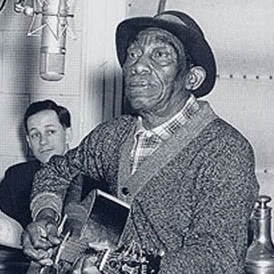
Mississippi John Hurt sings on this thinly-veiled song about domestic violence in “Nobody’s Dirty Business.” According to John, the sadism works both ways. Eventually his woman leaves. But John writes her a letter begging her to come back. She eventually returns and I suspect the dynamic keeps cycling over and over again. An important message brought to you from way back in 1935 – sometimes relationships just plain old don’t work out.

Sloppy Henry puts so much soul into his singing you really believe every word. This recording is very old, but sounds contemporary. Good storytelling is timeless.
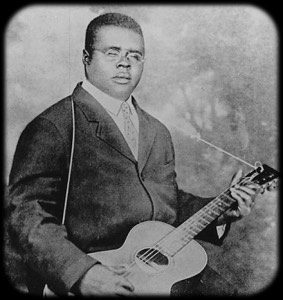
Although the subject matter of “One Dime Blues” may be cliche in the world of blues, no other artist has such a powerful cadence as the great Blind Lemon Jefferson. Jefferson’s quick-chords and toe-tapping rhythm is sharp juxtaposition with the song’s subject matter, each verse tackling the plight of the poor in the 1920s.